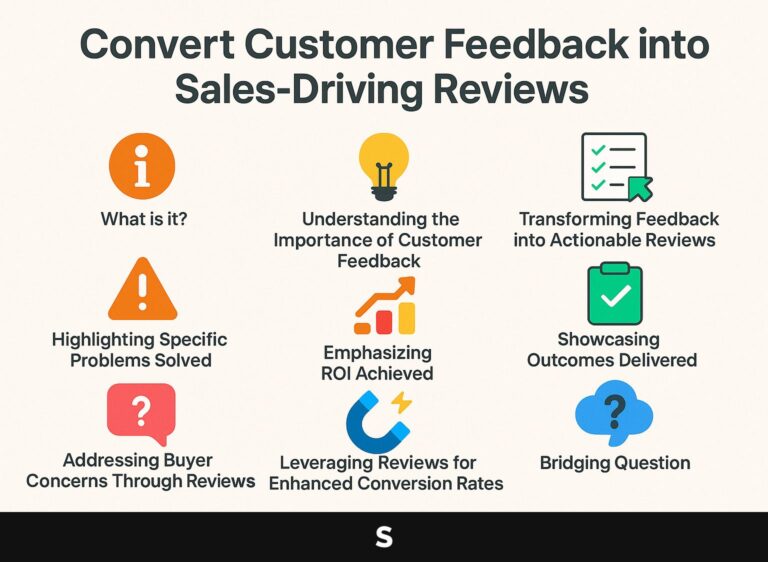Jewelry Store Reviews That Capture Special Moments
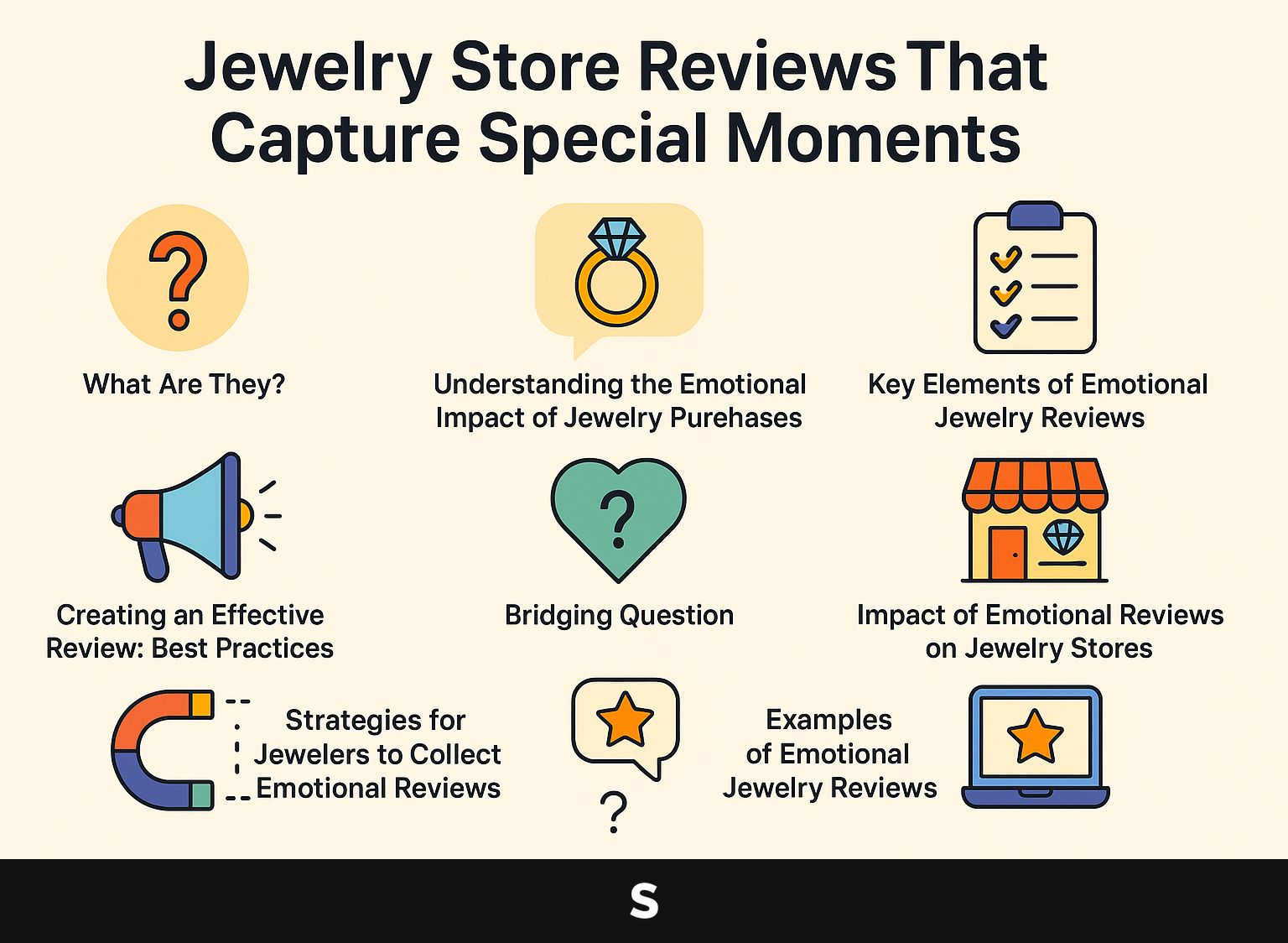
Each piece of jewelry has a unique story, and the reviews from your customers should show that personal experience. If you’re a local jeweler, learning how to get genuine positive reviews can greatly improve your business. This article looks at the impact of emotional storytelling in customer feedback, showing how personal experiences on platforms like Facebook and Instagram can emphasize memorable events in your shop.
Learn how to change basic testimonials into interesting stories that connect with possible customers and strengthen your local visibility.
Key Takeaways:
- Emotional reviews are more powerful than standard reviews, as they capture the personal and special moments associated with jewelry purchases.
- Jewelry often connects to personal emotions, so customers should share their emotional stories in reviews.
- Effective emotional reviews include details, storytelling, and personal anecdotes, and can impact customer trust, loyalty, and a jeweler’s reputation.
- Jewelry Store Reviews That Capture Special Moments – What Are They?
- Exploring How Buying Jewelry Affects Emotions
- Key Elements of Emotional Jewelry Store Reviews
- Creating an Effective Review: Best Practices
- How can jewelers encourage customers to share their emotional experiences?
- Impact of Emotional Reviews on Jewelry Stores
- Strategies for Jewelers to Collect Emotional Reviews
- Examples of Emotional Jewelry Reviews
- Using Reviews for Marketing and Branding
- How Customers Think About Reviews
- Future Trends in Jewelry Store Reviews
- Frequently Asked Questions
- 1. What is the importance of jewelry store reviews that capture special moments?
- 2. How can jewelry store reviews capture special moments?
- 3. Why do jewelers find detailed and emotional reviews more useful?
- 4. How can jewelers use emotional reviews to improve their business?
- 5. Can reviews about special moments in jewelry stores also benefit other customers?
- 6. How can jewelers encourage customers to leave emotional reviews?
Jewelry Store Reviews That Capture Special Moments – What Are They?
Jewelry store feedback that stands out often involves personal connections related to important life events. A customer, for instance, complimented Mark on making the ideal engagement ring, which made their experience unforgettable.
1. How do emotional reviews differ from standard reviews?
Emotional reviews go beyond product descriptions, capturing personal stories and experiences that deeply connect with potential buyers, unlike standard reviews that focus solely on features.
To create a genuine review, share your own experiences that demonstrate how you used the product in everyday life. If you’re discussing a smartwatch review, tell a story about how it helped you stay connected with your family during a crisis. Use vivid language to evoke feelings.
Using storytelling methods like interesting beginnings, building the character of the user, and explaining how the product addressed an issue can make your review connect with readers more. Try to write a story that readers can connect with, which can greatly impact what they decide to buy.
2. Why are special moments important in jewelry store reviews?
Important occasions like engagements and anniversaries play a key role in jewelry store reviews. They bring out the happiness and importance of these events, shaping how customers view the store.
Mentioning these memorable events in reviews strengthens emotional connection and increases trust with new customers. For instance, reviews that mention an engagement ring received during a proposal often see a 15% increase in engagement.
Tools like Yotpo or Trustpilot can help businesses feature such noteworthy customer stories prominently. Getting happy customers to talk about their favorite experiences can produce genuine content that connects with potential buyers, strengthening their bond and confidence in the brand.
Exploring How Buying Jewelry Affects Emotions
Jewelry is often bought for important moments like engagements or anniversaries, giving both beauty and sentimental importance to the purchase.
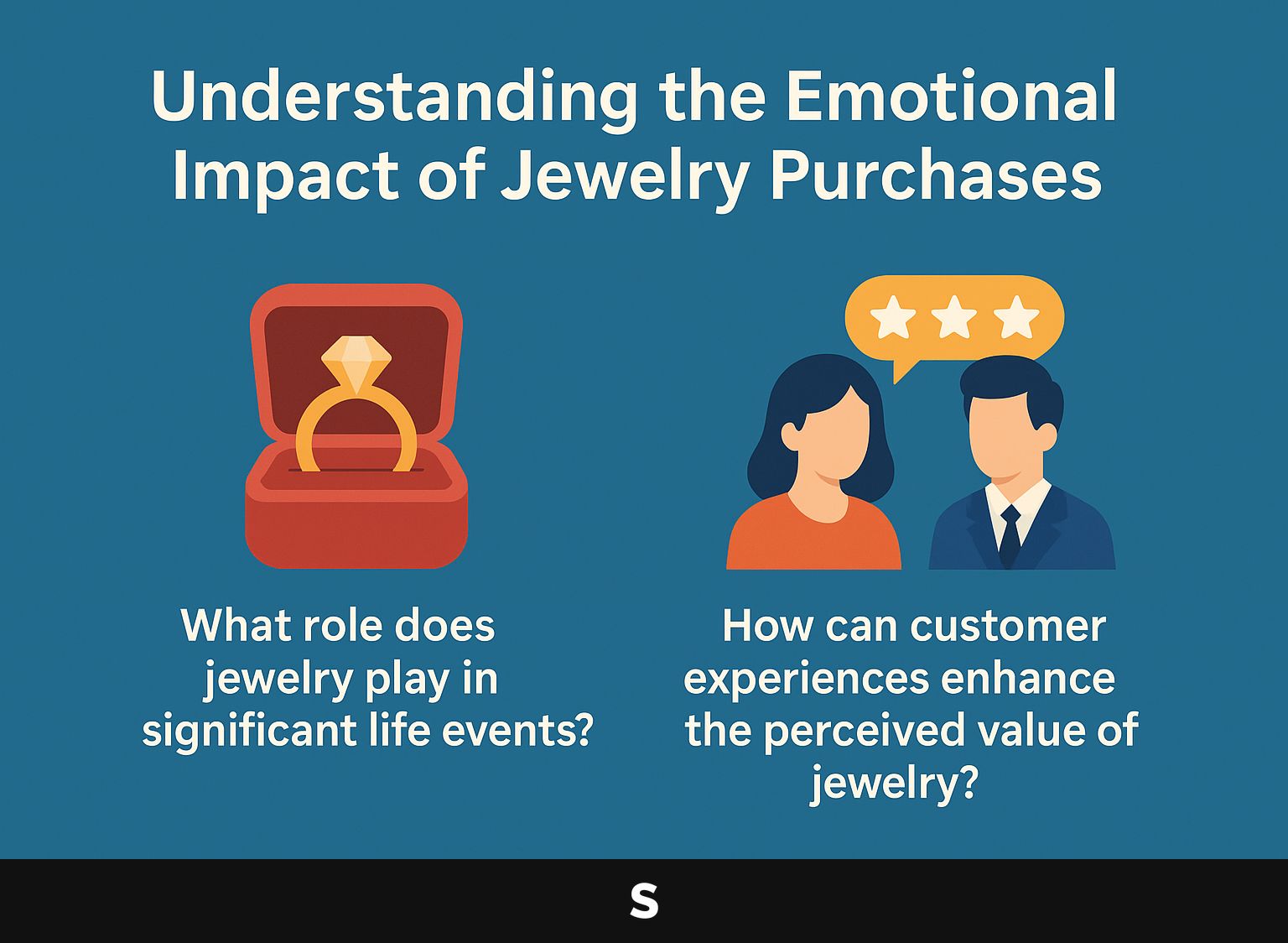
1. What role does jewelry play in significant life events?
Jewelry serves as a tangible reminder of important milestones, such as engagements or weddings, reinforcing emotional bonds and memories associated with those events.
For instance, a couple might choose a custom engagement ring to symbolize their unique love story.
One customer mentioned, “Choosing my fianc’s ring was very special; each part of it symbolized our time together.” Similarly, during anniversaries, gifting something like a pendant or bracelet can symbolize the years shared.
One customer recounted, “The necklace I received on our 10th anniversary marked not just time, but the countless memories we’ve created together.” These pieces become cherished heirlooms, rich with sentiment and meaning.
2. How can customer experiences increase the worth people see in jewelry?
Jewelry is often seen as more special when people share stories about positive experiences, especially those emphasizing excellent service or craftsmanship in creating the piece.
Jewelers can improve how happy customers are by providing unforgettable moments. For example, holding educational sessions on how to care for gemstones or the steps involved in creating custom designs can attract customers and demonstrate skill.
Encouraging interaction in these sessions leads to more sharing on social media. Sending customized follow-up emails to thank customers for buying something and asking them to share their experiences can help build stronger connections.
Sharing customer reviews on Instagram or Facebook shows what you do and helps your followers feel closer to your brand, making it seem more significant.
Key Elements of Emotional Jewelry Store Reviews
Reviews of emotional jewelry stores use specific examples, stories, and personal connections to engage readers and create a stronger effect.
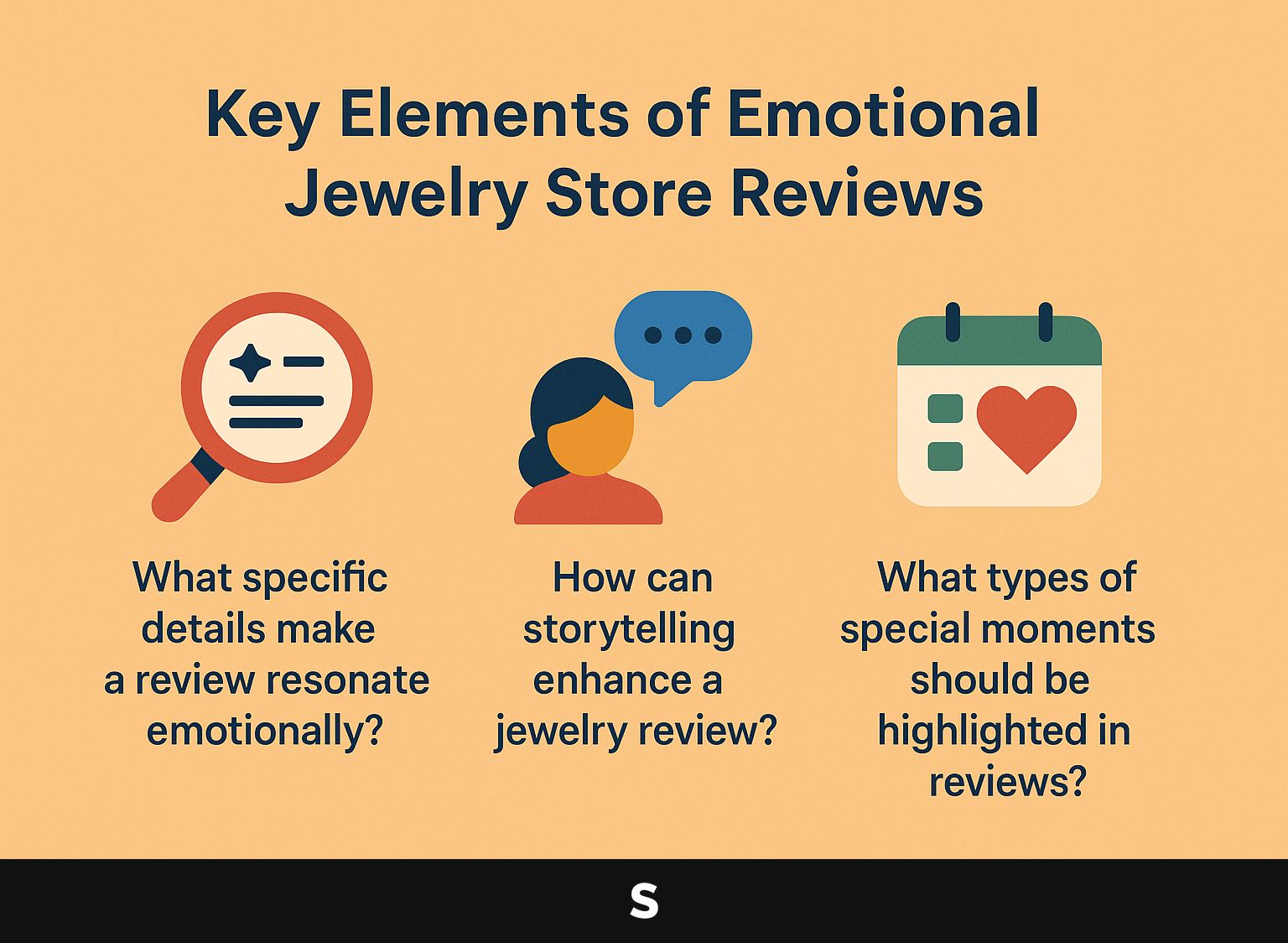
1. What specific details make a review connect emotionally?
Including specific details like the jeweler’s name, the type of jewelry, and the occasion for the purchase makes reviews more personal and relatable.
For example, when talking about a beautiful engagement ring from ‘Goldsmith Jewelers,’ mention the detailed diamond setting and the happy moment you proposed during a romantic dinner.
Incorporating how the luminous quality of the ring sparked a tear in your partner’s eye adds depth. Emphasize details of how the jewelry is made, like the unique design process, which shows the jeweler’s commitment.
This personalization makes the review stand out and helps potential buyers imagine their own unique experiences with the jewelry.
2. How can storytelling improve a jewelry review?
Telling a good story can turn a regular review into a moving tale, drawing in potential customers by relating to the experiences shared by others. To write interesting stories in reviews, start with a clear structure-beginning, middle, and end.
When talking about a backpack, describe a hiker caught in surprise rain, emphasizing how the backpack’s waterproof material helps. Include character links by telling a personal story or describing a situation that stirs feelings.
Be real by clearly stating both positives and negatives; openness builds trust and connects with readers, strengthening their link to the story.
3. What types of special moments should be highlighted in reviews?
Mentioning special occasions like engagements, anniversaries, or family heirlooms in reviews can make them more meaningful and relatable to potential customers.
To make your reviews connect with readers, try sharing detailed personal experiences. For instance, when reviewing a piece of jewelry, mention how it was a gift after a milestone anniversary or its significance during a family gathering.
Tools like StoryBrand can help you outline these narratives effectively. Using a template helps you include important details, like what was happening, how you felt, and how it affected you. This method connects with potential buyers and makes your review seem more genuine.
Creating an Effective Review: Best Practices
Writing good jewelry reviews involves knowing how to organize your thoughts, using emotional words, and sharing personal stories that connect with readers and show real experiences.
1. How should you organize a strong jewelry review?
A good jewelry review should be well-organized. Start with an interesting introduction, then provide specific details and your personal experiences, and finish with a strong ending. Begin your review with a captivating story, perhaps about how you received the piece or a memorable occasion connected to it.
In the body, talk about how the jewelry is made, the materials used, and the details of its design. For example, show how the shiny gold details make a simple pendant look more beautiful, or explain how wearing the right ring size feels comfortable.
Wrap up by sharing your thoughts on the piece and how it fits with your tastes, encouraging your readers to check out similar works.
2. How to include personal anecdotes in reviews?
Personal stories in reviews can make them feel genuine and easy to connect with, helping readers who are thinking about buying.
To bring back these memories, you might ask reviewers questions such as, “How did you feel when you got the jewelry?” or “How did the piece make a special occasion, like a wedding or anniversary, better?”
Including specific details, like where a proposal happened or the happiness during a big celebration, makes the story better. Ask them to talk about what makes the jewelry special, whether it’s the way it’s made or the memories it holds, turning a basic review into a touching story that connects with potential buyers.
3. What language evokes emotion in jewelry reviews?
Using vivid language and detailed terms can greatly increase the emotional effect of jewelry reviews, shaping how readers view the items and their buying decisions.
To write interesting jewelry reviews, include sensory details that stir emotions. For example, instead of just saying a ring is “beautiful,” describe it as having a “stunning shine, with light bouncing off the diamonds in a display of elegance.”
Choose “detailed” to describe the work and “bright” for gemstones. Use comparisons to describe stronger connections, like comparing a pendant’s shine to a special time spent together under the stars. This method grabs the readers’ attention and makes them think about having the item.
Jewelers can get customers to share their thoughts by sending custom messages and giving incentives for feedback. A practical approach is to mail handwritten thank-you notes and add a discount code for later buys. This shows thankfulness and motivates customers to return to your store.
Consider using platforms like SurveyMonkey to create simple feedback forms that can be emailed post-purchase. For social media, launch a campaign where customers can share photos of their purchases for a chance to win a gift card. These methods generate authentic engagement and promote your brand effectively.
Impact of Emotional Reviews on Jewelry Stores
Customer reviews with emotional content greatly influence trust and loyalty. They offer proof that can convince potential buyers in the jewelry market. For those looking to deepen their understanding of how to leverage reviews effectively, learning from positive review examples can be particularly beneficial.
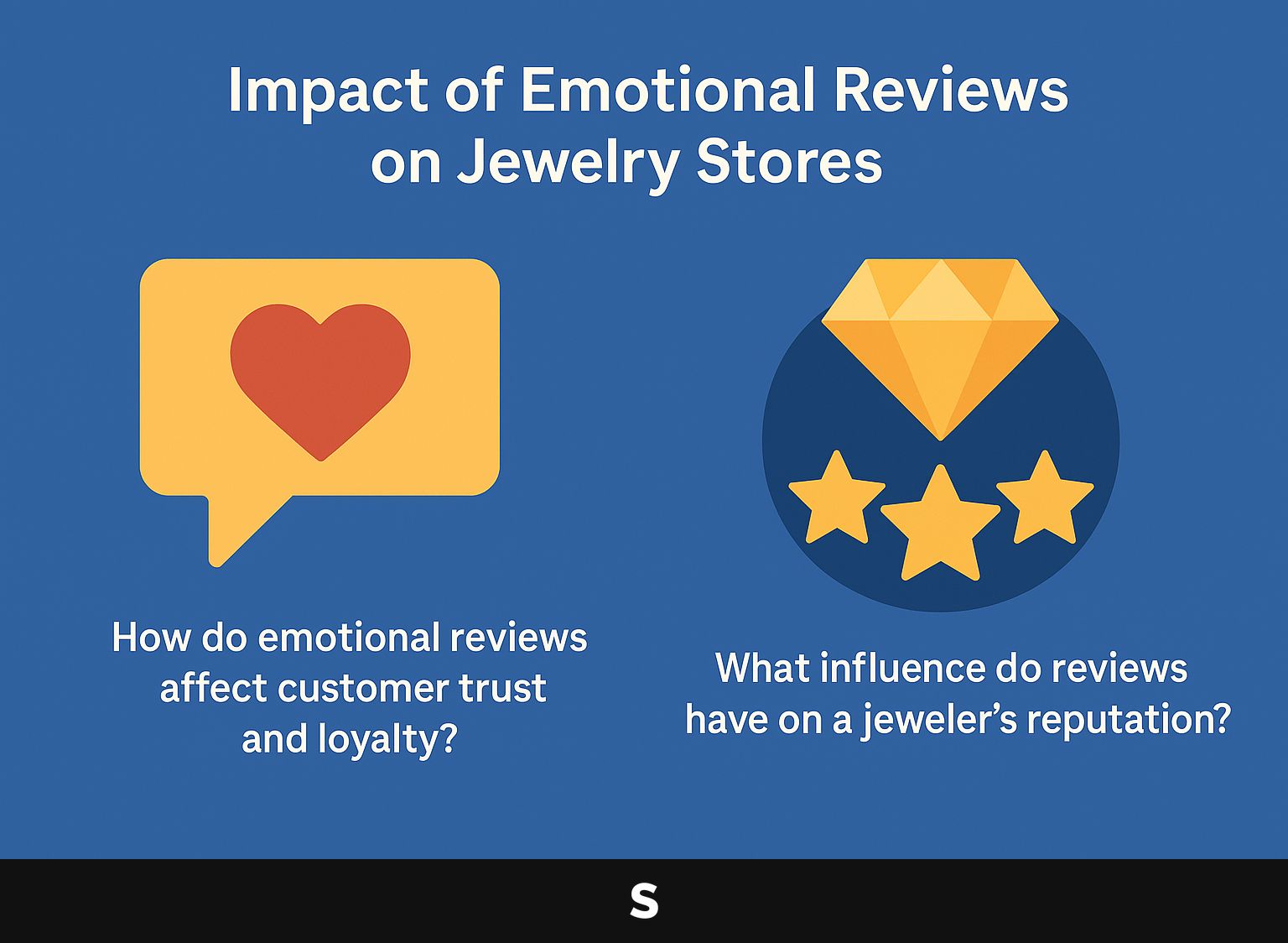
1. How do emotional reviews affect customer trust and loyalty?
Emotional reviews help build customer trust and loyalty by offering relatable experiences that potential buyers can connect with and validate their purchasing decisions.
Studies indicate that 79% of consumers trust online reviews as much as personal recommendations, illustrating the significant role these testimonials play.
For instance, a clothing brand that highlights customer stories through video testimonials sees a 40% increase in repeat purchases. Tools like Yotpo and Trustpilot can facilitate collecting and showcasing emotional reviews on your site.
By concentrating on genuine feedback, businesses increase trust and create a solid connection with their customers, resulting in long-term loyalty and higher sales.
2. What influence do reviews have on a jeweler’s reputation?
Reviews, especially those that express feelings, are important for building a jeweler’s standing in the community. They show happy customer experiences and the store’s dedication to quality.
For example, stores like Blue Nile have succeeded because of sincere reviews highlighting special occasions, such as engagements and anniversaries. These emotional bonds create trust and inspire people to recommend you to others.
Jewelers can use platforms like Yelp and Google Reviews to keep track of their reputation, reply quickly to feedback, and show happy customers on their websites or social media.
Jewelers can build a loyal customer base by telling stories that connect emotionally, drawing in new customers who appreciate personal experiences instead of just business transactions.
Strategies for Jewelers to Collect Emotional Reviews
Using good methods to gather emotional feedback can really help jewelers improve their brand’s image and attractiveness.
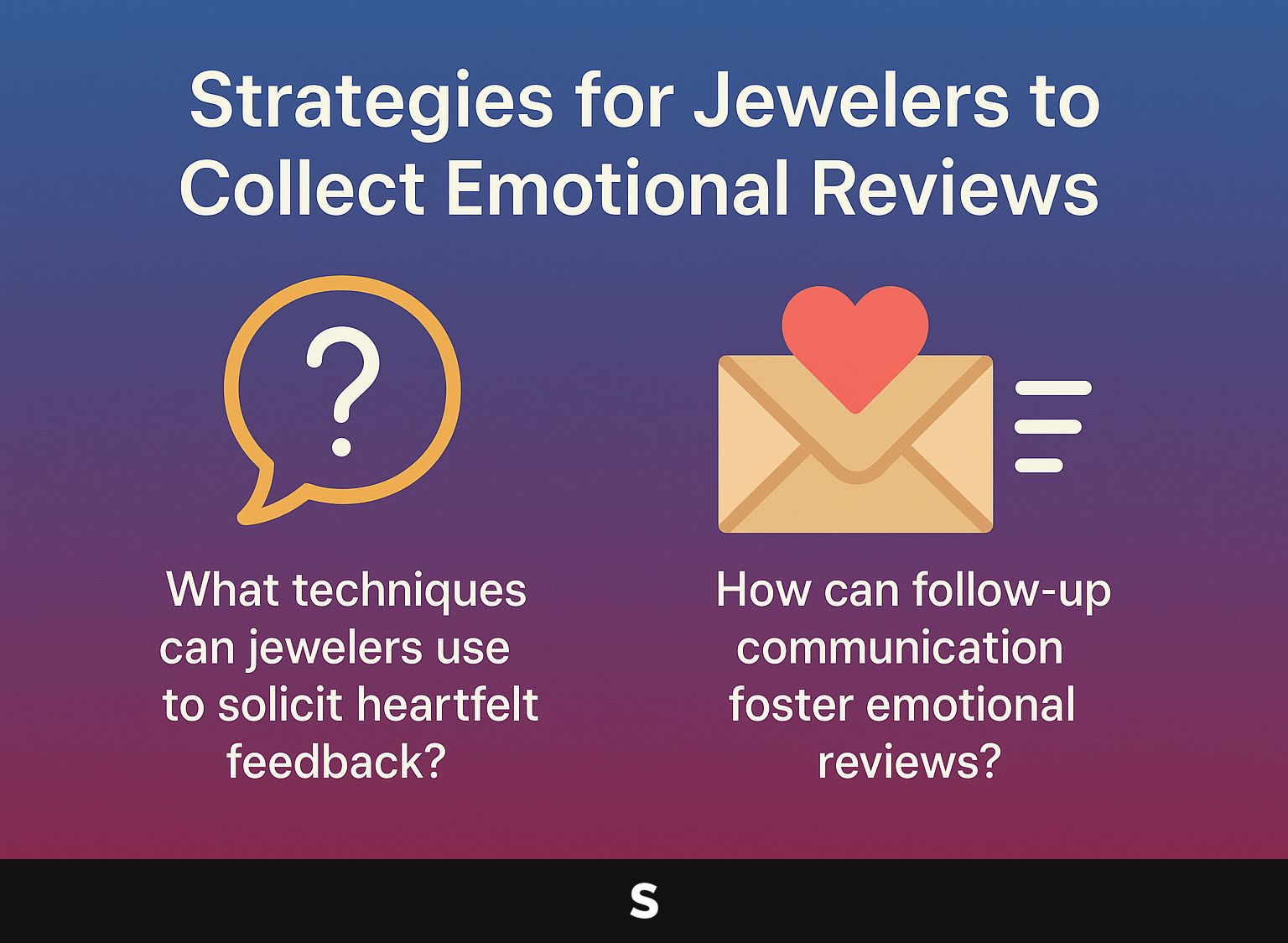
1. How can jewelers encourage genuine feedback from their customers?
Jewelers can collect honest feedback by directly contacting customers and creating a friendly store environment where people feel comfortable sharing their thoughts.
One effective approach is to follow up with customers via a handwritten thank-you note, expressing gratitude for their purchase and inviting them to share their experience.
Consider using online review platforms such as Google My Business, where you can send custom requests a week after a purchase.
Give customers feedback cards at checkout to make it easy for them to think about their experience. Timing is important; contacting customers soon after major purchases often gets more honest feedback.
2. How does follow-up communication encourage heartfelt reviews?
Staying in touch with customers is important for encouraging positive reviews. It helps jewelers connect with customers personally and encourages them to talk about their experiences.
To build a good system for follow-ups, contact customers within a week after their purchase to say thank you and ask for feedback.
Start with a warm thank-you email that invites customers to share their thoughts on their new jewelry. For example, you might say, “We hope you’re enjoying your new piece! We would love to hear your thoughts and see how you’re wearing it.”
Think about sending another message a month later. You might add a little incentive, like a discount on upcoming purchases, to strengthen the relationship.
Examples of Emotional Jewelry Reviews
Displaying sincere reviews can motivate customers and jewelers by showcasing the store’s special appeal.
1. What are some standout examples of emotional reviews from customers?
Emotional reviews often focus on particular interactions and the outstanding service offered by jewelers, which makes them memorable.
For instance, a customer might recount how a jeweler patiently designed a custom engagement ring, incorporating their partner’s birthstone, which added a personal touch. This story builds a strong emotional bond, showing the jeweler’s commitment to knowing what their client wants.
A review detailing how a jeweler resolved a last-minute repair for a wedding day would capture the urgency and importance of the event. These stories highlight both skill and kindness, which improves the view of good service.
2. How do these reviews reflect the values of the jewelry store?
Emotional reviews often reveal what a jewelry store represents, showing its commitment to excellent service, high-quality craftsmanship, and customer satisfaction.
Customers often talk about their experiences with well-informed staff who take the time to help them choose significant items. For instance, one review noted how a consultant helped a couple design a custom engagement ring, aligning it with their love story, which reinforced the store’s dedication to personalization.
Customers often praise the quality of these products, saying they are happy with how durable and attractive their items are. Linking genuine reviews with the store’s principles increases customer loyalty and enhances its reputation as a reliable jeweler.
Using Reviews for Marketing and Branding
Using emotional reviews for marketing and branding gives jewelers real content that connects with potential buyers, improving their outreach plans. To enhance these connections, understanding the distinction between customer experience and customer service is crucial, which is explored in our detailed breakdown.
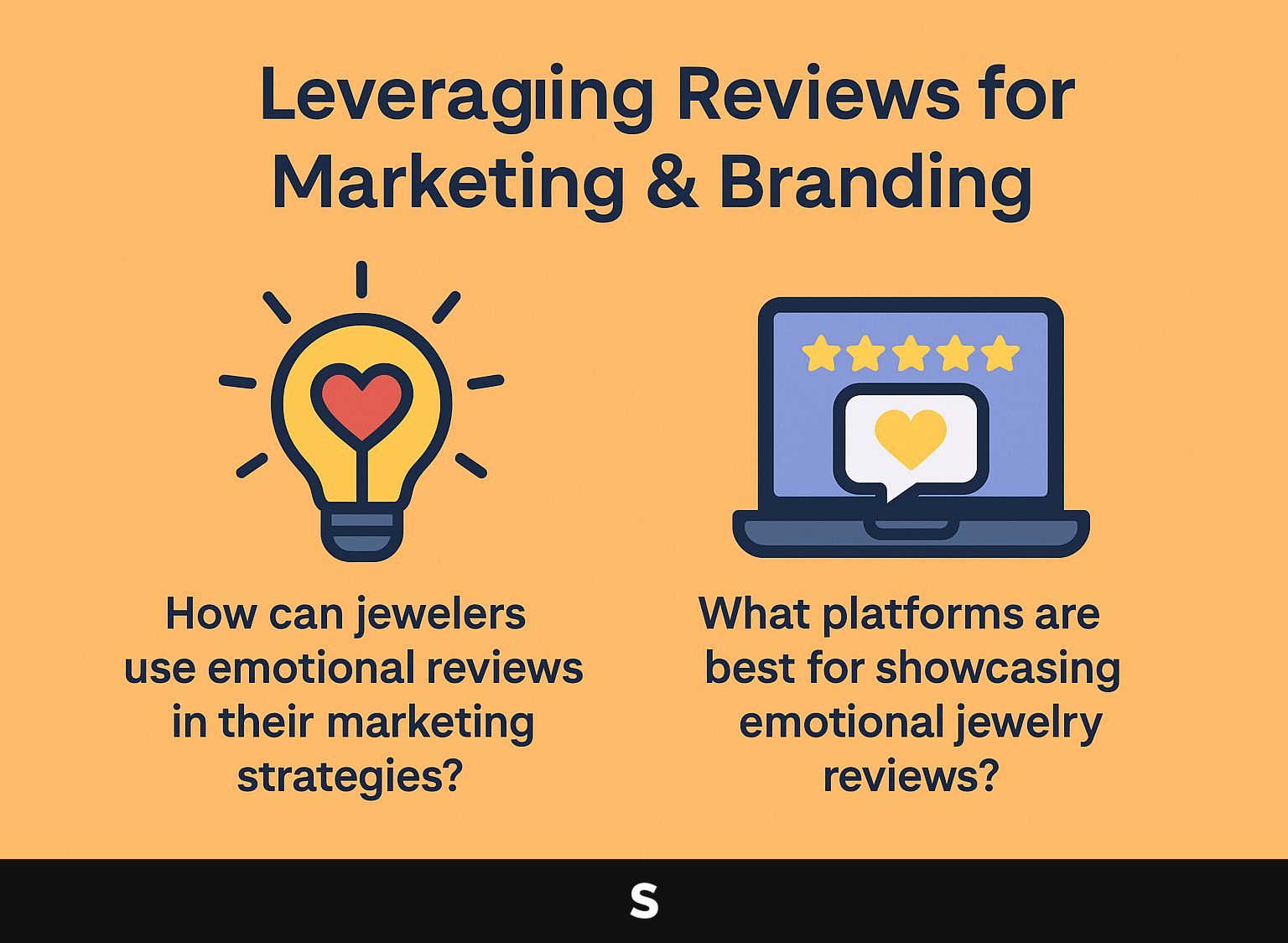
1. How can jewelers use emotional reviews in their marketing strategies?
Jewelers can use emotional reviews in their marketing by featuring them in ads, social media posts, and testimonials on their website.
- Begin by making video testimonials featuring happy customers to make the most of their reviews. This format makes your brand feel more relatable and increases trust.
- Post interesting quotes from reviews on Instagram with attractive visuals to catch people’s attention. Consider incorporating a dedicated testimonial section on your website, showcasing reviews prominently.
- By frequently sharing these emotional stories, you can build a genuine bond with possible buyers, affecting their buying choices and building loyalty to your brand.
2. What platforms are best for showcasing emotional jewelry reviews?
Certain platforms are particularly effective for showcasing emotional jewelry reviews, including social media channels like Instagram and Facebook, where visual storytelling thrives.
On Instagram, post clear and engaging photos with captivating captions to tell the story of each item. Share content made by users to make it feel more real.
Facebook emphasizes groups, allowing users to engage in meaningful conversations and share personal stories, making it great for emotional storytelling.
To make content that connects with people, use video testimonials for Instagram Reels and share detailed, heartfelt reviews in Facebook groups. Tools like Canva can help design eye-catching graphics, while Later can schedule posts, ensuring consistent engagement with your audience.
How Customers Think About Reviews
Grasping why customers write emotional reviews can help jewelers figure out what makes customers share their thoughts, leading to a better way of serving them.
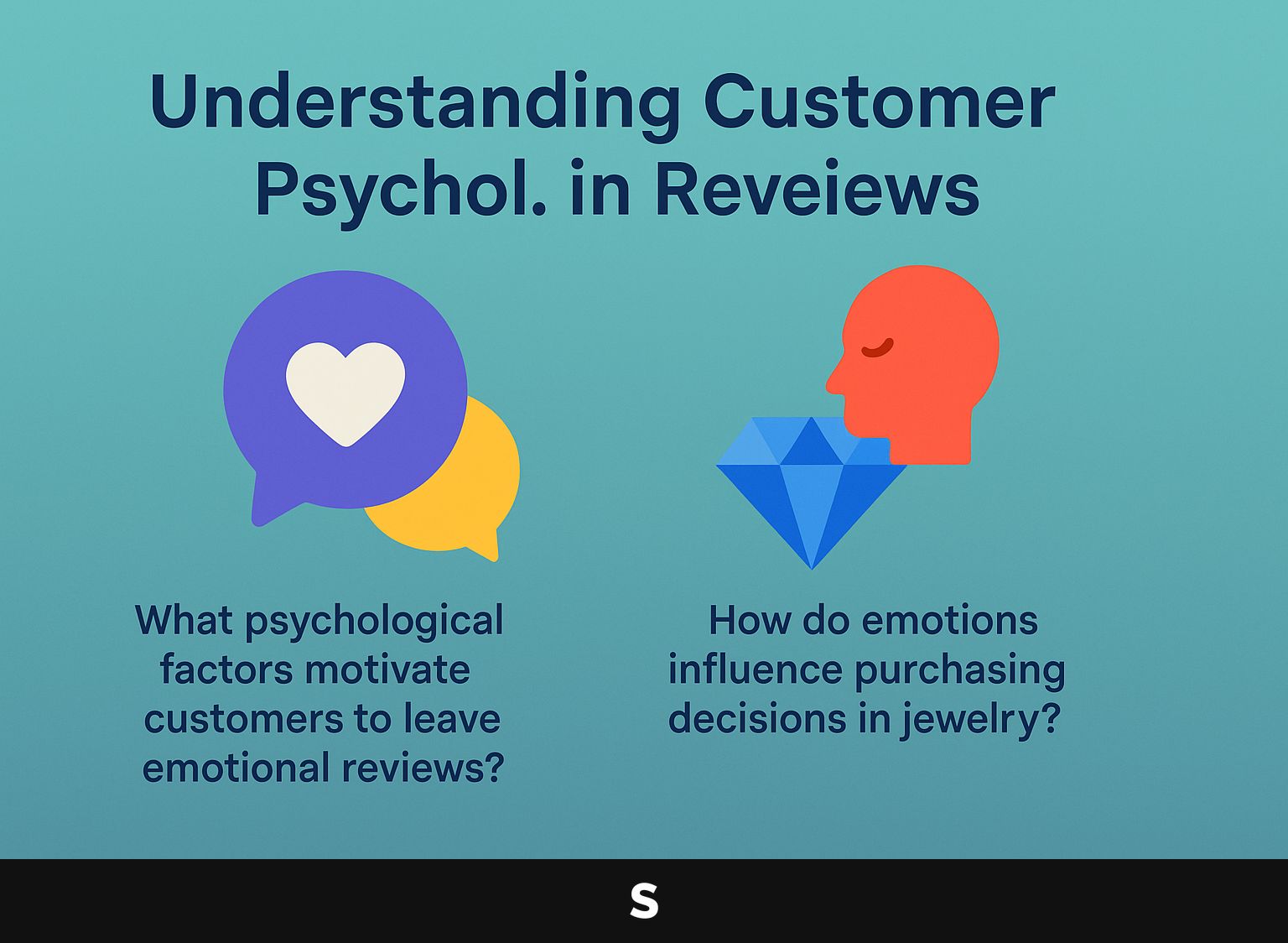
1. What psychological factors motivate customers to leave emotional reviews?
Customers are motivated to leave emotional reviews by various psychological factors, including social validation, personal storytelling, and the desire to influence others’ purchasing decisions.
Jewelers can use different methods to inspire these motivations. Start by creating a welcoming environment that prioritizes customer experiences and fosters a sense of community.
Encourage storytelling by inviting customers to share the stories behind their purchases, perhaps through social media hashtags.
Offer incentives like discounts or entry into a giveaway for those who leave a review. Showcase customer reviews prominently on your website and social media, as this validates their experiences while influencing potential buyers. These actions can greatly increase customer involvement and build brand loyalty.
2. How do emotions influence purchasing decisions in jewelry?
Feelings greatly impact buying decisions for jewelry, as people often connect jewelry with important life events and personal achievements. This emotional connection can lead to more sales and build loyalty.
For example, a couple celebrating an anniversary might want a custom item that tells their unique story. Jewelry brands like Blue Nile connect with customers emotionally by offering custom engravings, which strengthens the connection between the item and the buyer.
Case studies show that retailers who use storytelling in their marketing often see higher engagement rates. By focusing on the emotional importance of jewelry, businesses can connect with customers’ feelings, encouraging them to become loyal clients.
Future Trends in Jewelry Store Reviews
Jewelry store reviews are changing, with new patterns focusing on customer-specific experiences and using social media to see how customers feel.
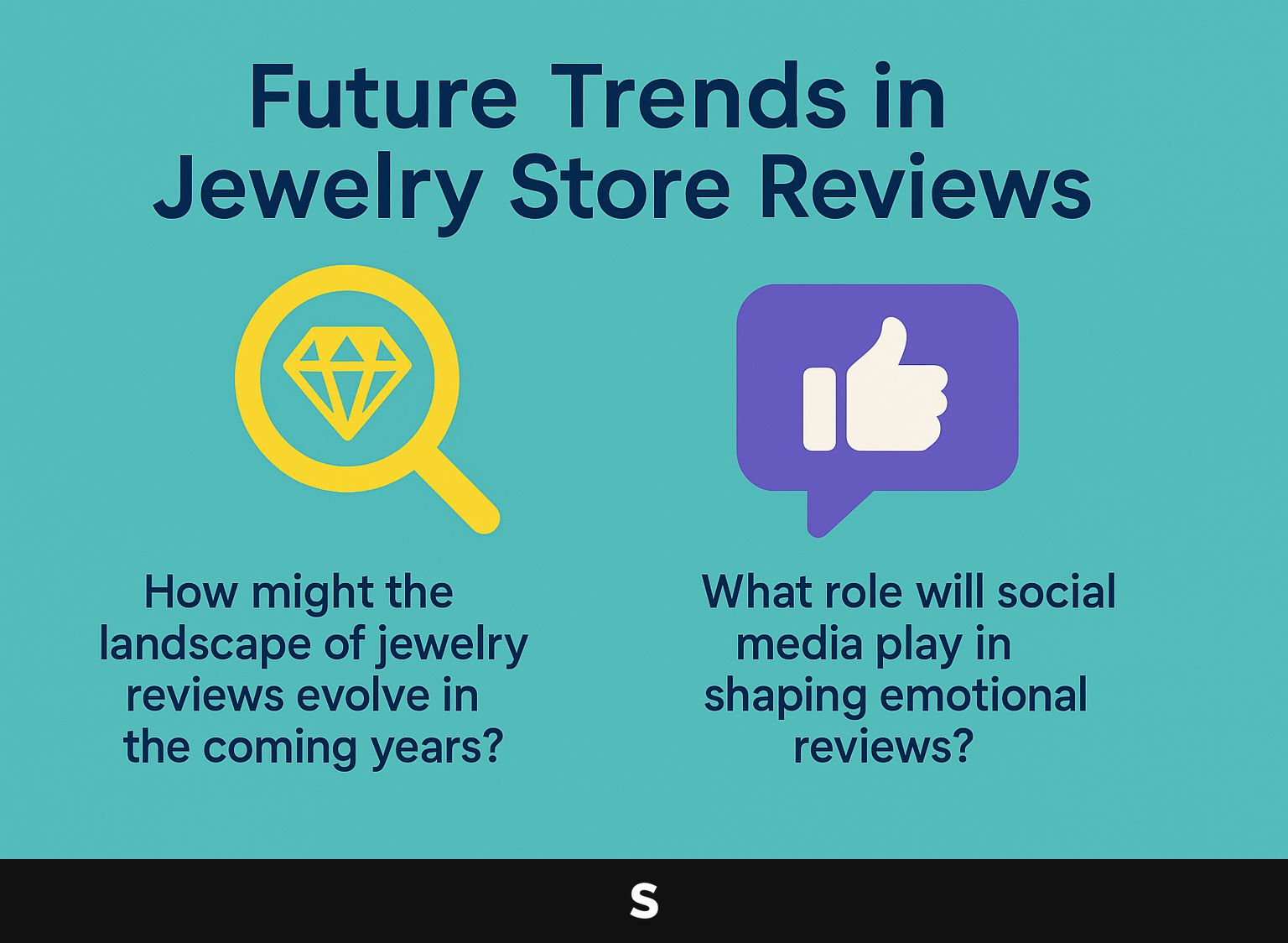
1. How might jewelry reviews change in the next few years?
As technology improves, the way people review jewelry is likely to change, with new ideas that make it easier for customers to interact and participate.
New technologies like augmented reality (AR) allow customers to view how jewelry appears on them and receive quick feedback on its fit and style. AI tools for analyzing sentiment can collect and understand customer reviews quickly, showing trends in what people like.
For example, companies like Virtual Try-On are changing how people shop by letting customers see how an item will look on them. These new ideas will improve customer feedback and influence design and marketing plans going forward.
Social media will play a critical role in shaping emotional reviews, providing platforms for customers to share their stories and connect with jewelry brands on a personal level. To effectively engage customers, jewelers should focus on authenticity and relatability in their posts.
Showing behind-the-scenes videos of how things are made can create emotional bonds. Using photos from customers wearing jewelry can help build a community feeling.
Platforms such as Instagram and Facebook offer features like Stories and Live sessions, which can humanize the brand and invite real time interaction.
Encourage customers to share their own experiences with hashtags related to your brand, instilling a sense of belonging and encouraging organic sharing of reviews.
Frequently Asked Questions
1. What is the importance of jewelry store reviews that capture special moments?
Jewelry store reviews that capture special moments are important because they provide a genuine and emotional account of a customer’s experience. These reviews help other customers choose wisely, and they show jewelers how their work affects their customers.
2. How can jewelry store reviews capture special moments?
Jewelry store reviews can capture special moments by sharing the details of the customer’s experience, such as the staff’s helpfulness, the quality of the jewelry, and the overall atmosphere of the store. These reviews frequently share personal stories and experiences, which make them stand out and evoke emotions.
3. Why do jewelers find detailed and emotional reviews more useful?
Reviews with lots of detail and emotion are more useful for jewelers because they show more about what the customer went through. These reviews show which parts of the store or service caught the customer’s attention, helping jewelers make their business better.
4. How can jewelers use emotional reviews to improve their business?
Jewelers can use emotional reviews to improve their business by listening to their customers’ feedback and implementing changes accordingly. These reviews can also serve as a way to showcase the positive experiences of customers, attracting new customers and building a loyal customer base.
5. Can reviews about special moments in jewelry stores also benefit other customers?
Yes, reviews about special moments in jewelry stores can benefit other customers by providing them with genuine and authentic feedback. These reviews can help customers make informed choices and learn more about the store’s services and products.
6. How can jewelers encourage customers to leave emotional reviews?
Jewelers can encourage customers to leave emotional reviews by providing exceptional service and creating a memorable experience for their customers. They can also reach out to satisfied customers and ask for their feedback, or offer incentives for leaving a review.




